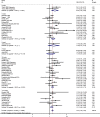Prognosis of pregnancy-associated breast cancer: a meta-analysis
- PMID: 32778072
- PMCID: PMC7418189
- DOI: 10.1186/s12885-020-07248-8
Prognosis of pregnancy-associated breast cancer: a meta-analysis
Abstract
Background: Pregnancy-associated breast cancer (PABC) is defined as breast cancer that is diagnosed during pregnancy and/or the postpartum period. Definitions of the duration of the postpartum period have been controversial, and this variability may lead to diverse results regarding prognosis. Moreover, evidence on the dose-response association between the time from the last pregnancy to breast cancer diagnosis and overall mortality has not been synthesized.
Methods: We systematically searched PubMed, Embase, and the Cochrane Library for observational studies on the prognosis of PABC published up to June 1, 2019. We estimated summary-adjusted hazard ratios (HRs) and the corresponding 95% confidence intervals (CIs). Subgroup analyses based on diagnosis time, PABC definition, geographic region, year of publication and estimation procedure for HR were performed. Additionally, dose-response analysis was conducted by using the variance weighted least-squares regression (VWLS) trend estimation.
Results: A total of 54 articles (76 studies) were included in our study. PABC was associated with poor prognosis for overall survival (OS), disease-free survival (DFS) and cause-specific survival (CSS), and the pooled HRs with 95% CIs were 1.45 (1.30-1.63), 1.39 (1.25-1.54) and 1.40 (1.17-1.68), respectively. The corresponding reference category was non-PABC patients. According to subgroup analyses, the varied definition of PABC led to diverse results. The dose-response analysis indicated a nonlinear association between the time from the last delivery to breast cancer diagnosis and the HR of overall mortality (P < 0.001). Compared to nulliparous women, the mortality was almost 60% higher in women with PABC diagnosed at 12 months after the last delivery (HR = 1.59, 95% CI 1.30-1.82), and the mortality was not significantly different at 70 months after the last delivery (HR = 1.14, 95% CI 0.99-1.25). This finding suggests that the definition of PABC should be extended to include patients diagnosed up to approximately 6 years postpartum (70 months after the last delivery) to capture the increased risk.
Conclusion: This meta-analysis suggests that PABC is associated with poor prognosis, and the definition of PABC should be extended to include patients diagnosed up to approximately 6 years postpartum.
Keywords: Dose-response; Meta-analysis; Pregnancy-associated breast cancer; Prognosis; Survival.
Conflict of interest statement
The authors declare that they have no competing interests.
Figures






Similar articles
-
The prognosis of women diagnosed with breast cancer before, during and after pregnancy: a meta-analysis.Breast Cancer Res Treat. 2016 Nov;160(2):347-360. doi: 10.1007/s10549-016-3989-3. Epub 2016 Sep 28. Breast Cancer Res Treat. 2016. PMID: 27683280
-
Increased mortality in women with breast cancer detected during pregnancy and different periods postpartum.Cancer Epidemiol Biomarkers Prev. 2011 Sep;20(9):1865-72. doi: 10.1158/1055-9965.EPI-11-0515. Epub 2011 Jul 12. Cancer Epidemiol Biomarkers Prev. 2011. PMID: 21750168
-
Postpartum diagnosis demonstrates a high risk for metastasis and merits an expanded definition of pregnancy-associated breast cancer.Breast Cancer Res Treat. 2013 Apr;138(2):549-59. doi: 10.1007/s10549-013-2437-x. Epub 2013 Feb 22. Breast Cancer Res Treat. 2013. PMID: 23430224 Free PMC article.
-
Prognosis of pregnancy-associated breast cancer: a meta-analysis of 30 studies.Cancer Treat Rev. 2012 Nov;38(7):834-42. doi: 10.1016/j.ctrv.2012.06.004. Epub 2012 Jul 9. Cancer Treat Rev. 2012. PMID: 22785217 Review.
-
Systematic Review of Survival Outcomes of Pregnancy-Associated Breast Cancer in Asian Countries.Malays J Med Sci. 2024 Apr;31(2):6-17. doi: 10.21315/mjms2024.31.2.2. Epub 2024 Apr 23. Malays J Med Sci. 2024. PMID: 38694578 Free PMC article. Review.
Cited by
-
Breast Cancer in Pregnant Young Women: Clinicopathological Profile, Survival, and Pregnancy Outcomes.Cureus. 2023 Oct 24;15(10):e47578. doi: 10.7759/cureus.47578. eCollection 2023 Oct. Cureus. 2023. PMID: 38022007 Free PMC article.
-
Prognosis, counseling, and indications for termination of pregnancy.Abdom Radiol (NY). 2023 May;48(5):1612-1617. doi: 10.1007/s00261-022-03772-2. Epub 2022 Dec 20. Abdom Radiol (NY). 2023. PMID: 36538080 Review.
-
A rapid reduction in tumor size by cyclin-dependent kinase inhibition in hormone receptor-positive postpartum breast cancer: a case report of two patients and a review of the literature.Ann Transl Med. 2022 Dec;10(24):1413. doi: 10.21037/atm-22-5201. Ann Transl Med. 2022. PMID: 36660646 Free PMC article.
-
Breast Imaging and Intervention during Pregnancy and Lactation.Radiographics. 2023 Oct;43(10):e230014. doi: 10.1148/rg.230014. Radiographics. 2023. PMID: 37708073 Free PMC article.
-
Postpartum Breast Cancer and Survival in Women With Germline BRCA Pathogenic Variants.JAMA Netw Open. 2024 Apr 1;7(4):e247421. doi: 10.1001/jamanetworkopen.2024.7421. JAMA Netw Open. 2024. PMID: 38639936 Free PMC article.
References
-
- Bray F, Ferlay J, Soerjomataram I, Siegel RL, Torre LA, Jemal A. Global cancer statistics 2018: GLOBOCAN estimates of incidence and mortality worldwide for 36 cancers in 185 countries. CA Cancer J Clin. 2018;68(6):394–424. - PubMed
-
- Johansson ALV, Andersson TM, Hsieh CC, Jirstrom K, Cnattingius S, Fredriksson I, Dickman PW, Lambe M. Tumor characteristics and prognosis in women with pregnancy-associated breast cancer. Int J Cancer. 2018;142(7):1343–1354. - PubMed
-
- Lee GE, Mayer EL, Partridge A. Prognosis of pregnancy-associated breast cancer. Breast Cancer Res Treat. 2017;163(3):417–421. - PubMed
Publication types
MeSH terms
Grants and funding
LinkOut - more resources
Full Text Sources
Medical

